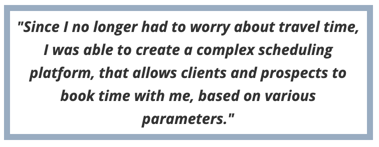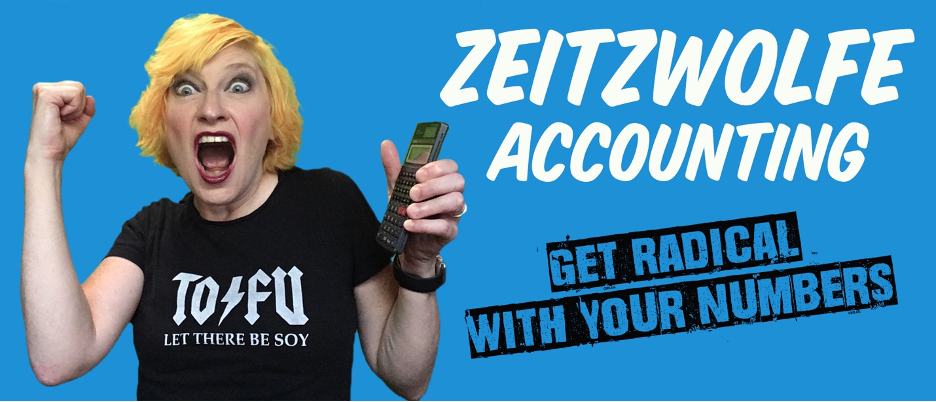Heather Zeitzwolfe participated in both the SBDC Business Design Series and Small Business Builders programs while starting her accounting business. Then the COVID-19 pandemic hit, forcing her to rethink her business model. Thanks to the assistance she got from these programs and the Advisers at the PCC SBDC, Heather has been able to continue moving towards her dream of being an entrepreneur. This is her story.
What inspired you to start your business? I have always wanted to run my own business, and when I turned 50 I figured that I'd better start before it was too late. I was also eager to explore all the new technology in accounting, reporting, dashboards, data, etc. and share that information with small businesses to help them utilize those tools. So I started Zeitzwolfe Accounting to provide profit advising for creative entrepreneurs and small agencies. My goal is to get creatives to stop ignoring their financials and get clarity on their cash flow. Running out of money is the biggest risk for a small business, and I don't want these folks to allow their dreams to become a nasty statistic!
What types of services did you receive and/or in which programs did you participate? First, I participated in the orientation. At that point I had a couple of ideas for a business and each were very different. Just sharing my ideas at the orientation helped me gain clarity on the one I wanted to focus on. Then I took the Business Design Series class, which helped give me momentum. The next class was the Business Builders program, and that was helpful too!
Before coming to the SBDC what challenges were you facing in your business? I was building the infrastructure of my business, setting up the entity, purchasing insurance, building the website, creating the branding, designing processes, researching technology, etc. These were all things that took time and money. The challenge was finding clients to support these activities, which niche I wanted to serve, and solidifying what sort of services I wanted to provide.
After that first class I was on the fence about taking the longer Small Business Builders program. I have two business degrees, so I wasn’t sure any of the information would be that impactful to me. I was wrong. Yes, there were topics I knew, however, the program is more than just information and education. It's about building relationships with other business owners. You go through a journey with your classmates who are working towards the same goal – to become an entrepreneur. Everyone’s path is different based on their personal experiences, their professional backgrounds, and their vision for their business. It’s a very supportive atmosphere where you share your wins and challenges. You also have access to the entire SBDC Advising team. There is no extra cost for the one-to-one advising, and once you’re in the program you can continue utilizing this service. I also found that, in addition, if you miss a class you are welcome to sit in on that particular segment in the future.
How have the services or programs helped you overcome those challenges? Setting my prices is something I struggled with. Like many new entrepreneurs, I had a tendency under value myself. I felt I needed to lower prices to gain more customers. In the Business Builders program I learned that being the low-cost provider is not a path for success! The program is very supportive and it encourages students to raise their prices and find their unique value proposition. No more competing on price.

What have you been doing to innovate (pivot) your business through the adverse conditions surrounding the Coronavirus pandemic? I always wanted to be 100% virtual and the pandemic has allowed me to do this. Since I no longer had to worry about travel time, I was able to create a complex scheduling platform, that allows clients and prospects to book time with me, based on various parameters. This was one of the best things I’ve implemented for my business. I also started reaching out to professionals through LinkedIn and set up virtual coffee meetings using my new scheduling tool. It allowed the folks I reached out to, to schedule themselves on my calendar. I have met far more people this way and have made some great, lasting and meaningful connections. Because of my increased connections, I started a weekly podcast (Get the Balance Right) where I interview someone within my niche. The podcast has been a lot of work, but it is worth it! Not only do I have a great excuse to meet new people, it gives me exposure that I wouldn’t have had before.
What are your plans moving forward as the state of Oregon continues the process of reopening? I’m going to remain as virtual as possible and continue serving clients in both in Oregon and other states. As client needs transform due to the changing new normals that arise, I plan to continue to pivot through the use of emerging technology and my continuing education.
What would you say to other small business owners thinking of working with the SBDC? If you’re just starting your business the PCC SBDC is a wonderful opportunity to tap into the minds of others and become part of a welcoming and supportive community. If you’ve been in business for a while but have struggled with your entrepreneurial vision, then this program will help you build the framework you need, supply you with tools, and help you get focused.
Get Business Help from PCC's SBDC
PCC's Small Business Development Center offers numerous small business development courses and resources to help small businesses address challenges arising from the pandemic. Our small business advisers are here to help businesses like Zeitwolfe Accounting. See how we can help you too.

 Programs and services are provided to the public on a non-discriminatory basis. Language assistance service are available for limited English proficient individuals. Reasonable accommodations for persons with disabilities will be made if requested at least two weeks in advance. Please contact us at 971-722-5080 or sbdc@pcc.edu, to request accommodations. Oregon Small Business Development Centers are funded in part through a cooperative agreement with the U.S. Small Business Administration, and the Oregon Business Development Department.
Programs and services are provided to the public on a non-discriminatory basis. Language assistance service are available for limited English proficient individuals. Reasonable accommodations for persons with disabilities will be made if requested at least two weeks in advance. Please contact us at 971-722-5080 or sbdc@pcc.edu, to request accommodations. Oregon Small Business Development Centers are funded in part through a cooperative agreement with the U.S. Small Business Administration, and the Oregon Business Development Department.




